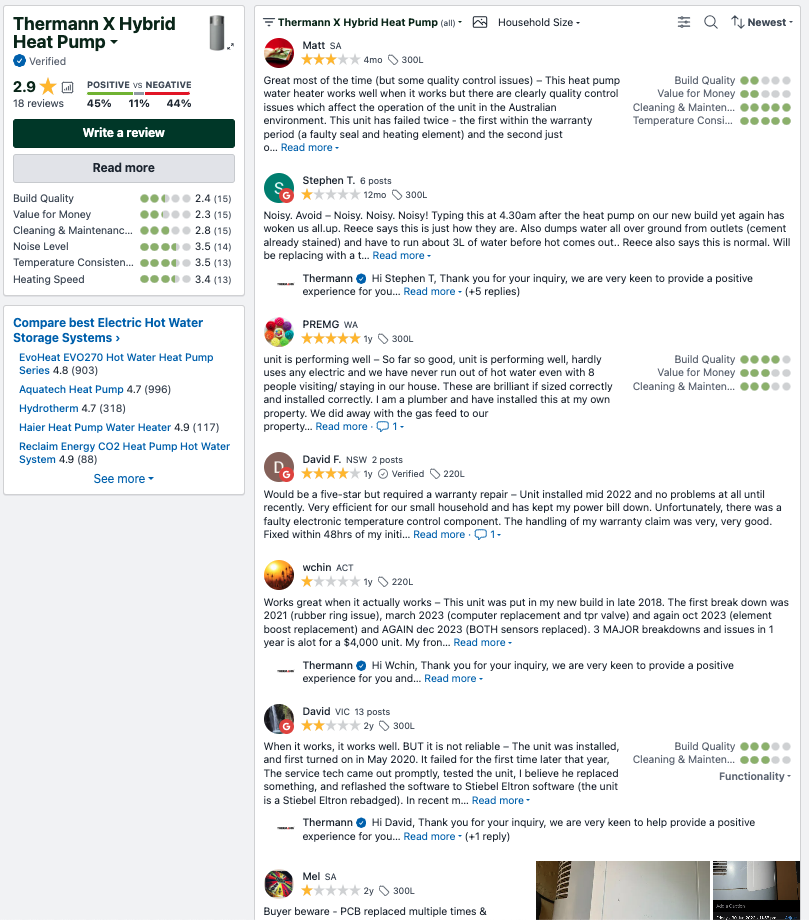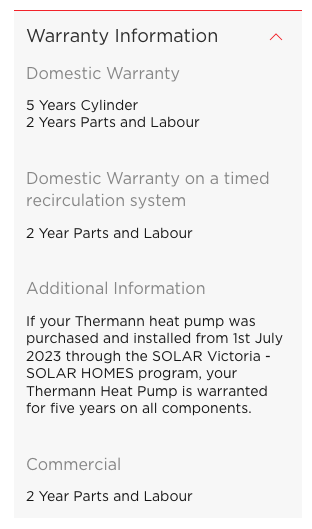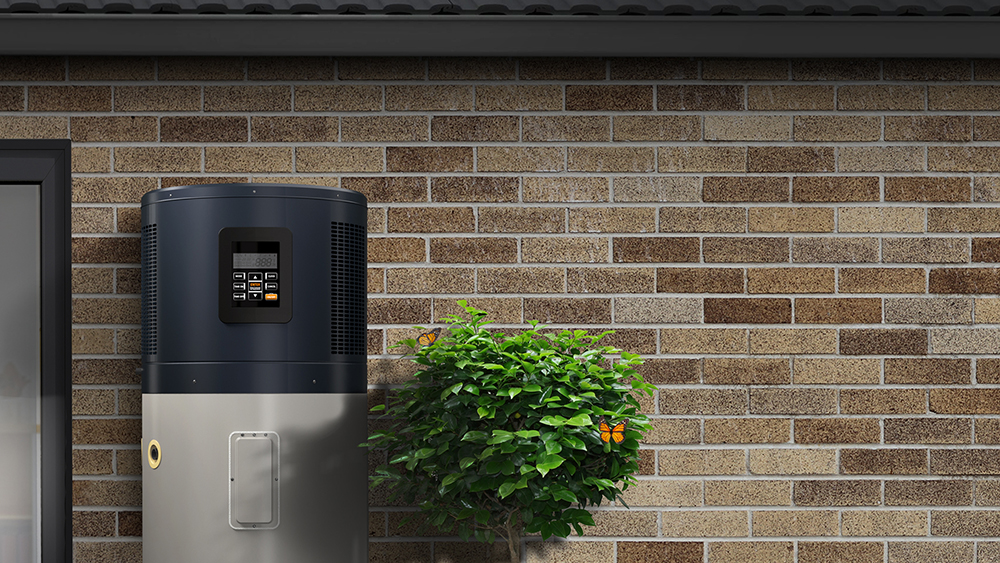People looking for hot water often go to trusted names thinking that they will be reliable. Names like Rheem, Rinnai and Reece are all long established brands in hot water and plumbing in the Australian marketplace. Thermann is Reece Plumbing’s “home brand” hot water products.
The key question is – just because these brands have been around for a long time making and selling other products, do they make a good heat pump?
Often the answer is ‘no.’
And this is the conclusion I arrive at with the Thermann heat pump hot water unit – it is best avoided.
In this review, I clearly set out how I have come to my conclusion, using my framework of four factors (Cost, Reliability, Refrigerant and Maintenance). I explain why I think these units should be avoided and introduce alternatives that are not only more affordable, but also appear more reliable.
—
A quick note on Powrhouse to explain why we are well qualified to review heat pump hot water units. We have mapped just about every unit on the market, comparing them across a variety of the factors like capacity, power, tank recovery, place of manufacture, reviews, refrigerant, warranty and cost. Please see our “Compare Heat Pump Hot Water Units” spreadsheet to see our research. We are independent and this review is our opinion informed by our research.
1. Cost
Thermann heat pump hot water units are overpriced. The 300L Thermann Hybrid Heat Pump sells for just under $4,000 through Reece. The installation price is hard to tell with heat pumps as rebates reduce the price, even though we need to add labour on top. But as a comparison, our preferred brands like Aquatech and Haier are around $1,000 less. As another point of comparison, Reclaim units, which are considered the best unit in the market, retail for around $5,000. Based on my review and concerns below, it’s then hard to make a case for Thermann heat pumps. My view is customers are wiser to either pay less and go with the more affordable unit, or pay more and get a premium, top of the line unit.
2. Reliability
I like to look at reviews of heat pumps and their warranty conditions to analyse their reliability.
The Thermann X Hyrbid Heat Pump scores 2.9 stars from 18 reviews on Product Review. I’ll admit that reviews are not perfect, and often lend themselves to be more negative as people vent their frustrations, but nevertheless it’s hard not to be concerned when many of the reviews claim the unit repeatedly breaks down.

Pleasingly it looks like Thermann responds to these reviews with an offering of customer support.
I also like to look at a unit’s warranty as a guide of how much faith the company has in the product. The warranty on the Thermann units is 5 years on the tank and 2 years on the parts and labour. Thermann also states that if your unit is purchased through the Solar Victoria (i.e. if you were eligible for the rebate), you will receive 5 years on all components. Thermann does this as otherwise the units would not be eligible for rebates and be even more expensive to install. In summary, the warranty is basically the minimum Thermann can get away with.

Lastly, the Thermann X Split Heat Pump has actually had a recall. If a plastic cover on the side of the unit to operate buttons on the controller board, there is a risk of injury from a live wire. This doesn’t exactly instil confidence in Thermann products.
3. Refrigerant
Thermann heat pumps still appear to use R-134a (according to the website in April 2025). R-134a has a global warming potential of 1,430, which means if 1 tonne of the gas were to escape, it would have the same global warming effect of 1,430 tonnes of carbon dioxide. R-134a has now been phased out, largely because the Victorian rebate initiatives made these units ineligible for rebates. But many of these rebates only apply for replacing old hot water heaters, so perhaps Thermann units still use R-134a if they are being used in new builds (meaning the rebates wouldn’t apply anyway). I’d expect Thermann to upgrade the refrigerant to propane or similar, as many other manufacturers have done.
4. Maintenance
One positive about the Thermann units is they require very little maintenance. At the risk of getting into the technical detail, they use an impressed current anode which effectively uses an electrical current to protect the tank from corrosion. Thermann describes them as “Maintenance-Free” (which is mostly correct, although you should still have the unit serviced every 5 years). Many other heat pumps use sacrificial anodes which are effective, but they require more ongoing maintenance to check the state of the anode. Impressed current anodes are a better choice.
Other Factors
Other factors when considering Thermann heat pumps:
- Noise – operates between 45dB, which is in line with the rest of the market
- Place of Manufacture – Thermann claim the units are designed in Germany. I’m not sure but that probably means the units are made in China, which is consistent with the rest of the market
Thermann Heat Pump Review Summary
It is clear to me that people should stay away from Thermann heat pump hot water units. They are overpriced, probably not eligible for rebates meaning they become even more expensive and there are serious reliability concerns.
The good news however is there are alternative heat pump hot water units that tick all the boxes and are still affordable. I like Aquatech and Haier Monoblock as a safer choice. They are good quality, mid-market units that are significantly.
If you are interested in a quote for a heat pump hot water unit and/or you would like to discuss your options, we’d love to hear from you.



 Subscribe to Our
Subscribe to Our